 Iran’s Attack on Israel
Iran’s Attack on Israel
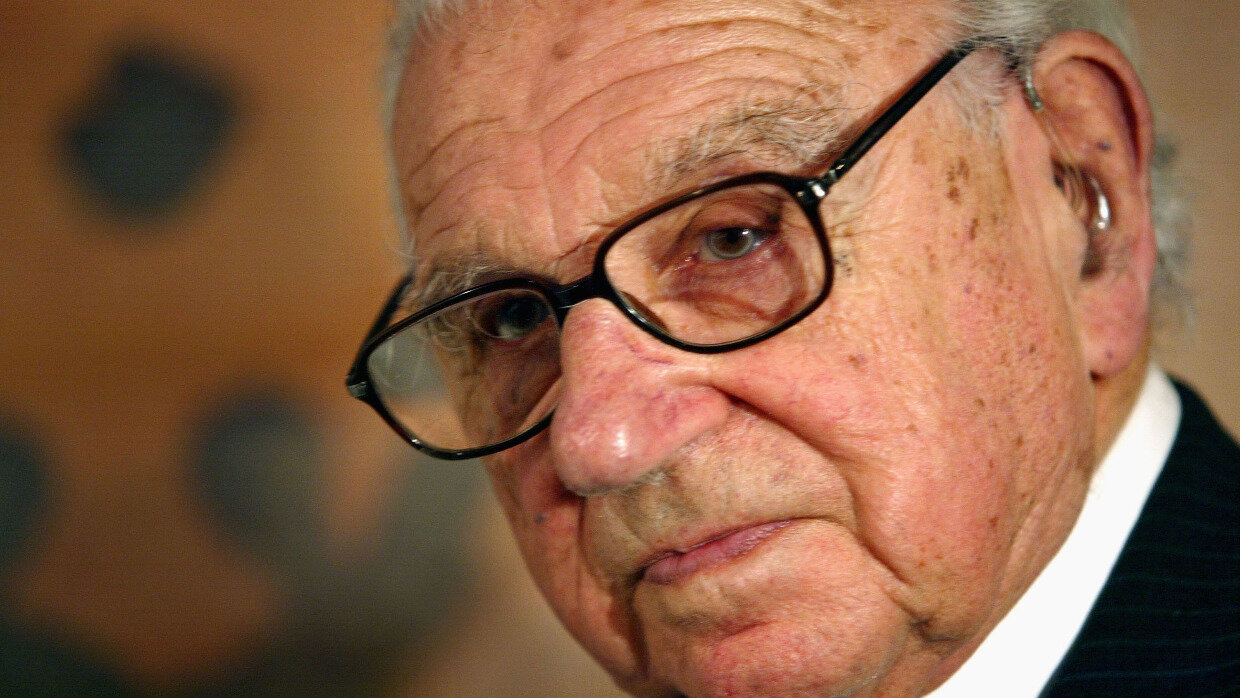

10 min read
The new movie about Sir Nicholas Winton’s life-saving efforts during the Holocaust should inspire us today.
The new movie One Life depicts the story of one “ordinary” man who, in the darkest of times, rose to extraordinary heights. Today, over 6,000 people are alive because of Sir Nicholas Winton’s actions saving the lives of hundreds of children before World War II.
Here are a few facts about Nicholas Winton, and five ways his legacy affects us today.
Nicholas Winton’s parents, Rudolph and Barbara Wertheim, were German Jews who immigrated from Bavaria to London in 1907, two years before Nicholas was born. In their new home in England, they did all they could to assimilate, changing their last name to Winton and living an English Christian lifestyle, even baptizing Nicholas as an Anglican. They sent Nicholas and his two siblings to prestigious schools. Nicholas attended the storied Stowe boarding school where he showed a natural brilliance in math and became an accomplished fencer.
The Wintons remained close to their many relatives in Germany and Nicholas even moved to Germany as a young man, working in various banking jobs in Berlin and Hamburg. He lived in Paris for a time, then returned to London, where he worked for the London Stock Exchange.
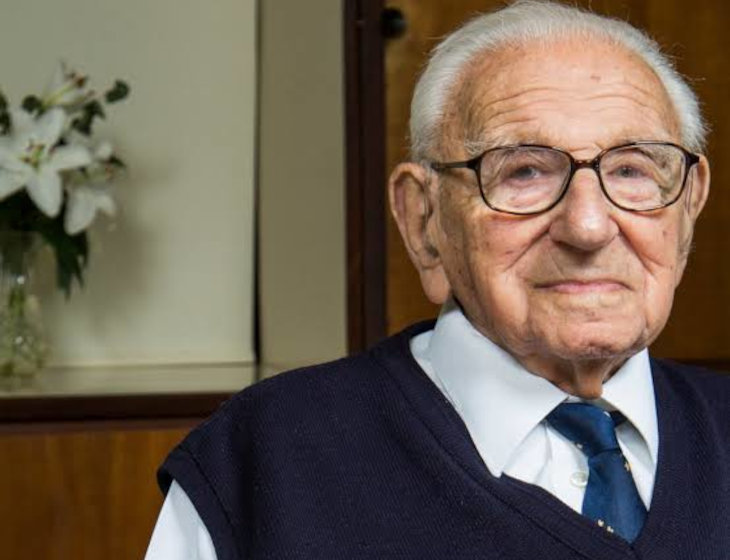 Sir Nicholas Winton
Sir Nicholas Winton
Nicholas seemed like the ultimate insider, with one glaring exception: Throughout the 1930s, he and his family heard harrowing stories from their German Jewish relatives, particularly after Hitler’s election to Chancellor in 1933.
In 1934, Germany moved to exclude Jews from government jobs and sharply limited the number of Jewish students admitted to public schools. Nicholas’ family’s state of Bavaria barred Jews from medical schools. In 1935, the Nuremberg Laws institutionalized antisemitism in Germany, stripping Jews of the vote and other privileges. During the Kristallnacht pogroms of November 9-10, 1938, mobs burned down and destroyed over 250 synagogues and 7,000 Jewish-owned businesses. Hundreds of Jews were killed and injured and 30,000 Jews were arrested across Germany and Austria.
Nicholas became fervently anti-Nazi and was frustrated that so many members of Britain’s upper and middle classes seemed happy to accept or even sympathize with Hitler’s rise and antisemitism. Unusual for a well-to-do banker in the 1930s, Nicholas joined a Socialist group, which provided him an outlet for his anti-Nazi beliefs.
Just after the horrors of Kristallnacht, Nicholas planned to take a skiing vacation in Switzerland over the Christmas holidays. When he told his friend and fellow Socialist group member Martin Blake about his plans, Martin was aghast. He told Nicholas that he had to change his plans and come to Prague to help Martin’s humanitarian work instead.
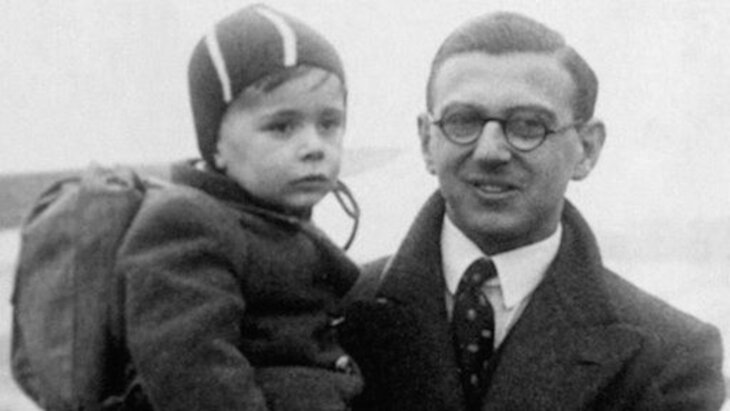 Nicholas with one of the children he rescued.
Nicholas with one of the children he rescued.
Just two months before, in October 1938, Germany - with Britain’s blessing - had annexed a portion of Czechoslovakia known as the Sudentland. Hundreds of thousands of desperate Jewish refugees and others fled the territory and were now living in Prague with no work, little food, and no way to leave. Blake told Nicholas about the British Committee for Refugees from Czechoslovakia, a group he and others had hastily formed. Would Nicholas come and join them?
Nicholas spent his holidays in a Prague hotel, working to help his fellow Jews flee Czechoslovakia. At the same time, Nicholas heard people were organizing groups of children to flee Germany and Austria and come to England. He decided to do something similar for Czech children.
With no formal permission for his plan, Nicholas announced a new “Children’s Section” within his friends Committee to help Czech refugees. He announced: any parent who wished to register their child to flee to Britain should stop by his hotel room and fill out one of the application forms he’d just created. So many parents came by to sign up their children to be rescued that Nicholas soon opened an office in the center of Prague to process all the applications. He had almost no help from other humanitarian workers in Prague and worked alone. Nearly all of the parents who tearfully lined up to speak with him, starting at 6 AM, were Jews.
At the end of his Christmas holidays, Nicholas returned to London and began the long, arduous process of gaining permission for Czech children to flee to England. In the evenings, after work, Nicholas and his mother filled out reams of paperwork. It wasn’t easy: after Kristallnacht, Britain’s Parliament allowed refugees 16 and younger into the country, but with stringent requirements. Each refugee had to have a family that was willing to house them, plus a guarantee of £50 - thousands of dollars in today’s value - to pay for their eventual deportation out of the country. For months, Nicholas and his helpers looked for foster families, raised funds, and planned the logistics of getting children out of Prague and into England. To find families, Nicholas used all his contacts, then resorted to putting ads with pictures of the children on them in British newspapers.
A planeload of children that Nicholas and his mother had arranged took off from Prague on March 14, 1939. The next day, Germany occupied two more Czech lands with large Jewish communities: Bohemia and Moravia. Nicholas and his mother worked feverishly to bring out more children. In the following months, they were able to arrange seven trainloads of refugee children to leave Prague, travel across Germany to the coast, then board boats transporting them to England. A particularly difficult hurdle was gaining permission from the Netherlands to allow Jewish refugee children to cross Dutch territory in trains: the Netherlands strictly forbade any Jewish refugees from crossing its borders.
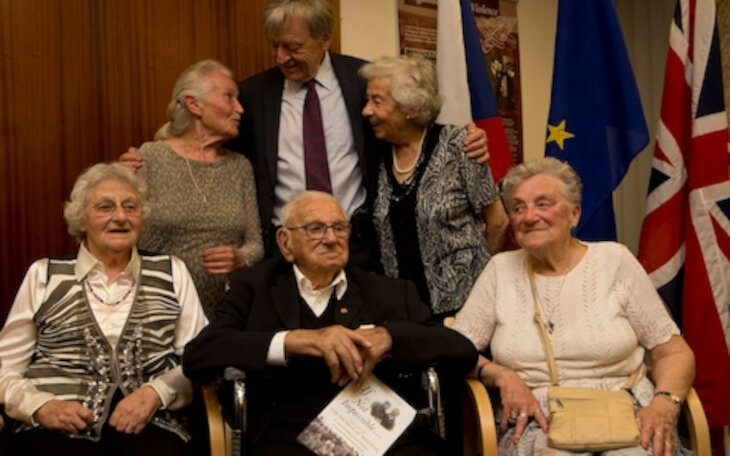 Nicholas, on his 105th birthday in 2014, with some of those he saved as children from the Nazis
Nicholas, on his 105th birthday in 2014, with some of those he saved as children from the Nazis
Nicholas also wrote to American President Franklin Delano Roosevelt, begging him to take in some of the Czech Jewish children he was working with. He received no reply. The only other country that was willing to take in a small amount of children was Sweden.
Nicholas was haunted by the final trainload of 250 children he was unable to rescue. They were due to leave Prague in September 1939, but were unable to after war broke out on September 1st, 1939.
During World War II, Nicholas served in the British Air Force as a pilot. After the war, the Air Force gave him a grisly task: emptying and surveying hundreds of army crates that were left behind by the Nazis in Germany. These contained looted goods of murdered Jews, including crates that were entirely filled with wedding rings, and others that were filled with Judaica items such as Shabbat candlesticks. After leaving the military, Nicholas worked in local politics and business and served on the board of several charities. He married and he and his wife had three children.
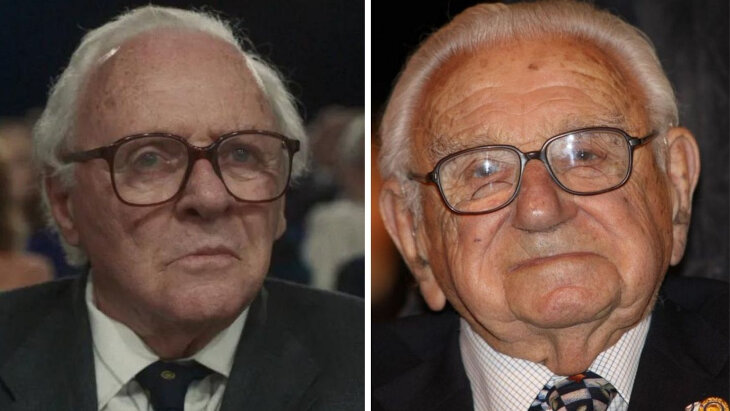 Anthony Hopkins, left, plays Nicholas Winton in the film One Life.
Anthony Hopkins, left, plays Nicholas Winton in the film One Life.
Nicholas said almost nothing about his wartime heroism. His actions became broadly known only in 1988, when the British Jewish TV personality Esther Rantzen invited him to watch her television program That’s Life being recorded as part of her studio audience. On the show, Esther surprised Nicholas, describing his life-saving actions and announcing that one of the girls he’d saved 50 years before - now a middle-aged woman named Vera Gissing - was in the studio audience. Nicholas Winton shook her hand. On a later show, Esther Rantzen asked if anybody else in the studio audience owed their life to Nicholas Winton. The entire audience rose to their feet.
One of the workers on that landmark 1988 episode was James Hawes, who has now directed the feature film One Life about Nicholas Winton’s rescue efforts. It’s a beautiful coda to the story of one “ordinary” man who felt he did nothing extraordinary.
In December of 1938, Nicholas Winton could easily have proceeded with his skiing trip to Switzerland instead of traveling to Prague to help Jewish refugees. We all have some version of this choice in our own lives: will we busy ourselves entirely with our own lives, or are we willing to look beyond ourselves - even when it is inconvenient - and see other people’s pain?
It would have been easy for Nicholas Winton to dismiss the dangers facing Europe’s Jews as the problems of people who had little to do with him. Assimilated, Anglicized, living a Christian lifestyle, Nicholas Winton seemingly had few Jewish elements in his busy life. Yet he possessed an unshakeable knowledge that he was part of the Jewish people. In his people’s hour of need, he realized that there was no looking away and took decisive action. No matter how removed we might feel from the wider Jewish community, ultimately, we are all part of one large, extended Jewish family.
The work that came to define Nicholas Winton’s life never looked very glamorous. For nine long months, he toiled away in obscurity, writing letters, placing newspaper ads, raising money, and planning logistics. There was nothing seemingly exciting about this work. He received little recognition for it before appearing on TV in 1988. Yet Nicholas realized that he had no choice but to help others, in whatever way he could. His was an entirely different world view from today’s culture of instant gratification and media attention.
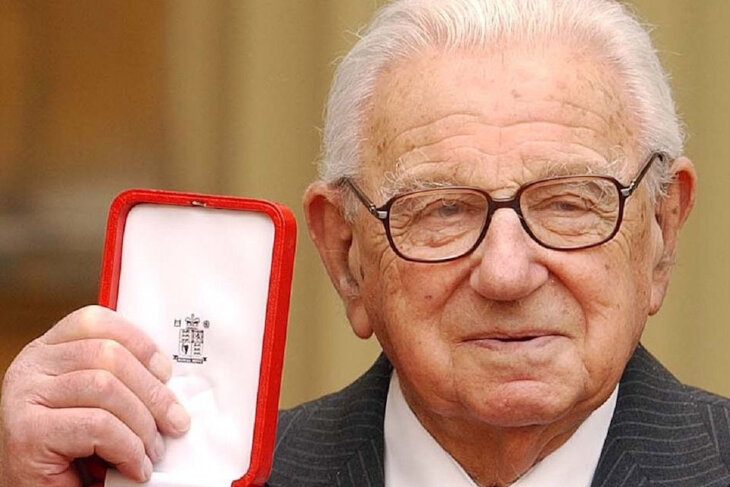 Sir Nicholas Winton after being knighted by the Queen in 2003
Sir Nicholas Winton after being knighted by the Queen in 2003
Goodness can often look unexciting. Vital work often seems prosaic. And those who labor in the shadows working for a better world are no less important than those who toil in the spotlight.
The great Jewish sage Rabbi Tarfon taught something that Nicholas Winton understood implicitly: “You are not required to complete the task, yet you are not free to withdraw from it” (Ethics of the Fathers: 2:21). At a time of overwhelming need, Nicholas saved the lives of “only” 669 children. He was haunted by the 250 children he was scheduled to bring to England in September 1939 who never made it. Yet the people he saved, as well as their many descendants, owe their very lives to his heroism.
Nicholas Winton considered his actions to be entirely “ordinary”. Everyone is faced with decisions about how to act, how to help others, how to be selfless, which appear entirely “ordinary”. Today, you have the chance to engage in “ordinary” heroic acts. Follow Nicholas’ example and take the time today to call your elected representatives today and ask them to work to rescue the over 100 Israeli hostages still being held by Hamas. Donate charity to Israeli causes. Post accurate news about the Israel-Hamas conflict on social media. Reach out to your fellow Jews and check how they’re doing. Find ways that you can make a difference right now. It might not be glamorous. But as Nicholas Winton’s legacy reminds us, even the most “ordinary” actions can be heroic.

There is another side to this story.
It is covered in this study.
https://discovery.ucl.ac.uk/id/eprint/10102786/1/10.14324_111.444.jhs.2020v51.014.pdf
About 10% of children brought over in the Winton Group were brought over by the Barbican Mission and other groups intending specifically to convert them to Christianity
I should add that although Chief Rabbi Hertz, Rabbi Dr Schonfeld and other orthodox Jews were upset with Nicholas Winton for involving the Barbican Mission (most kindertransport initiatives did not try to convert Jews to Christianity), nevertheless these rabbis sponsored a number of places through Nicholas Winton.
I read the book about his life story, and it was amazing.💜
Thank you for the specifics of the work involved in Nicholas Winton's rescue efforts. The documentary on PBS TV several years ago was very moving, but only focused on the TV show That's Life. It is moving even now to read how everyone in the audience stood up as Winton's survivors.
Nicholas Winton for us the most wonderful man in the world he saved my sister
Amazing that you have such a deep personal connection to this wonderful man. I am going to see a screening of this film tomorrow night (Thurs. March 14) at the Simon Wiesenthal Museum of Tolerance. After this article, I am even more excited to see it than I already was.